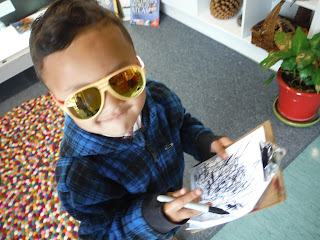I have been in the extremely privileged
position to visit the Opal School in Portland, Oregon twice. My most recent
visit was in June of this year. This school is an amazing place for an early
childhood teacher like me, full of beauty, wonder, inspirational teachers and
environments set up to provoke children’s wonder and imagination.
I gained an enormous amount of knowledge
from each visit, but one thing that really stood out to me was their passion
for encouraging children’s thinking and imagination. The power of the
imagination is a factor I consider in my daily teaching as I see its full and wondrous
potential for lifelong learning, yet at times I feel that imagination is pushed
to the outside of learning and considered not particularly relevant or
important in terms of education.


I’m often asked why, at Mairtown, we consider
developing a child’s imagination to be so important? Why we support play not
academics? Why when we engage in inquiry
work with the children we don’t give the answers to questions, but allow the children’s
imaginations to take them on a journey of their own discovery. This is all
because at Mairtown we want to develop children’s critical thinking skills,
their creative problem solving – basically their imaginations - with imagination
comes discovery and ultimately academics. We know that the only
way to create human beings with imagination, is to provide them with opportunities
to develop it for themselves when they are very young. These opportunities are
found in one place - in play. Play is everywhere at Mairtown. It can be seen
when children are creativity playing and engaging in the arts, when they are jumping
off our wooden stumps with excited yells, when they are exploring on our nature
programme, jumping in a puddle, are pretending to be mums and dads, or a bird gliding through the sky. At Mairtown we are surrounded by play every day.


“Imagination is more important than
knowledge. For knowledge is limited to all we now know and understand, while
imagination embraces the entire world, and all there ever will be to know and
understand.” Albert Einstein
Many researchers and scientists consider
that humans are unique in our endless capacity for imagination. Yet still I
feel, imagination is a trait that is not valued or respected nearly as much as
it should be.


So why do I believe that imagination is
a fundamental aspect of education and learning. As Liu and Noppe-Brandon write,
‘imagination leads to creativity,
which leads to innovation.’
I believe imagination is crucial to the
future success of our youngest learners. This is backed up substantially by
educationalists and researchers who claim that for young students, ‘imagination
is the key to their successful lives. The kinds of workers that the world needs
are problem solvers, who can look at problems from a different
perspective and see many possibilities’ (Eisenhower). Community playthings, UK agree when they state, ‘Children are
the world’s future inventors, physicists, and writers. Imagination enables the
‘possibility thinking’ essential for innovation. It opens new realms’. You see, to be able to think of something that has not yet happened, to see
something from another’s point of view, to think through strategies for a
problem you have, all these require imagination.

‘Imagination is not just a cute faculty that children
use to weave fantasies: it is one of the most effective tools in the learner’s
toolbox. Scientists, designers and executives need a powerful imagination just
as painters and novelists, and it can either be developed, through appropriate
experience and encouragement, or left to shrivel up’ Guy Claxton


How do we foster imagination at
Mairtown? Personally I feel a great deal of this is down to the image we have
of the child. We are a group of teachers who see children as their own researchers
with their own questions. We don’t always give children the answers all the
time, we allow children to create their own questions, ideas and answers – even
if at times - the answers given may seem a bit far-fetched to our adult minds.
‘Great ideas
have legs. They take you somewhere. With them, you can raise questions that
can’t be answered. These unanswerable questions should be a source of comfort.
Puzzlements invite the most precious of human abilities to take wing. I speak
of imagination, the neglected stepchild of education. (The
Satisfactions of Teaching, Educational Leadership (63), 6)


We as adults also collaborate with the
children, to wonder alongside them. You may hear us frequently asking, ‘I wonder why that happened, I wonder what
that means, What does it make you wonder?
We allow children time to think and role model using our own
imaginations ‘Let’s
use our imaginations and play with ideas; I don’t know the answer but I think
it would be fun for us to think about it’.
We work alongside the children in
playful inquiry where we, as teachers, provoke and facilitate learning for our
children without any specific, predetermined pathway or product in mind. We
offer provocations such as open-ended questions, engaging environments,
materials and loose parts for children to explore. And we give support by observing,
listening, reflecting and encouraging dialogue.
We see play as an attitude and one that gives
importance to the creative flow and joyful activity that children so naturally
engage in.
‘The
potential of the child is stunted when the endpoint of their learning is
formulated in advance (Edwards, Gandini & Forman, 1998, The Hundred
Languages of Children).
Hei konā mai,
Christine
























